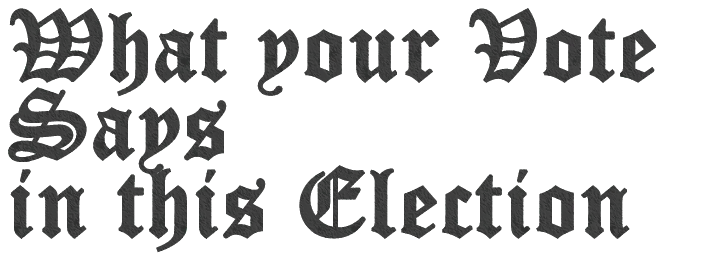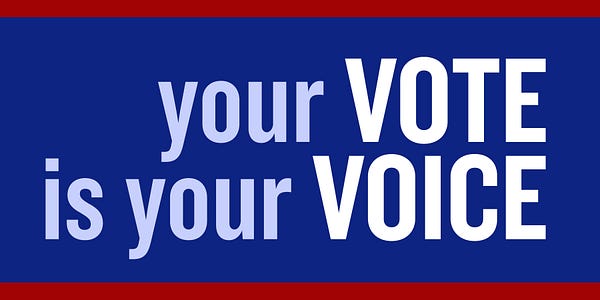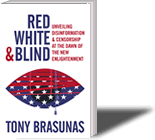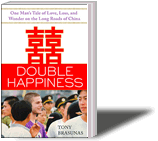What Your Vote Says
4 2016

Democracy is not an exact science. There are countless things one might wish to say with a vote, but a single vote for one candidate or another communicates with little precision. In 2016, this wild presidential election, given everything we’ve seen from leaks to gropes to voting purges to visiting Popes, examining what the candidates have done and what they verbally stand for is about all we can do in determining what our one vote will say.
To many voters, given the chicanery and the poor choices, the election is an illegitimate exercise at this point. More on that in a minute.
For now, since by all accounts the election will go forward on Tuesday, let’s consider what a vote for each candidate says to the ruling establishment and our representatives. Since there isn’t a perfect candidate for most of us, our vote says in essence what we’re OK with, what we can tolerate:
- A vote for Donald Trump says: I’m OK with racism, homophobia, and religious scapegoating, with bullying, sexism, and mocking the political system, with global corporate rule, and ignoring climate change, and with voting for a candidate who doesn’t have elective political experience, so long as the candidate has a strong chance of winning, isn’t Hillary Clinton, and is from the nominally conservative major party.
- A vote for Hillary Clinton says: I’m OK with lying and with deleting evidence of it, with rigging elections, with using political advantage to amass personal wealth, with waging war with multiple countries, with more fracking, more pipelines, and global corporate rule via the TPP, so long as the candidate has a strong chance of winning, isn’t Donald Trump, and is from the nominally liberal major party.
- A vote for Jill Stein says: I’m OK with voting for a candidate who isn’t likely to win, and who doesn’t have elective political experience, so long as the candidate has a track record of honestly, speaks with consistency, will fight hard on climate change, corrupt money in politics, and affordable education and healthcare, and pushes for peaceful resolutions to global issues, and is building a new party.
- A vote for Gary Johnson says: I’m OK with voting for a candidate who isn’t likely to win, who supports global corporate rule and ignores climate change, so long as the candidate speaks openly and candidly, will push for personal liberty, corporate deregulation, democracy reform, marijuana legalization, an end to domestic spying, and favors smaller government, and is building a new party.
Given what we’ve seen throughout this election season and what we’ve learned from the Wikileaks, we know the mainstream corporate media is working with the two larger, older parties’ campaigns to make their candidates appear easier to tolerate when it comes to voting. Nonetheless, your vote is your voice. Only you get to choose what you say with it.
Is This Election Legitimate?
Donald Trump and Hillary Clinton are the two least popular presidential candidates in history — by a long shot. This election could be called illegitimate not just because there was fraud in the primaries, but because when it comes to considering the best candidates this nation could produce, these two candidates don’t pass any baseline test for popularity. Democracy, on an elementary level, is supposed to be about popularity — popularity of both candidates and ideas. Out of 300 million Americans, this is the best we can do?
Bernie Sanders certainly connected with citizens, and his ideas still poll extremely well. But Clinton and Trump? No, it doesn’t add up for these two. Jill Stein and Gary Johnson look attractive — if not positively brilliant — in comparison.
So, no, perhaps this is not a legitimate choice for president in 2016.

Nevertheless, sitting the election out isn’t a legitimate option either. Not voting doesn’t communicate rejection of the election’s legitimacy; it communicates nothing at all. It is the proverbial tree falling in the woods that no one hears. Citizen democracy requires more.
The most rational, obvious, and democratic option you have is to speak, to make your imperfect and imprecise communication with the political system by choosing one of the four candidates listed above.
Your vote is your voice. You — and only you — get to choose what you say with it. While voting your conscience to communicate your views is imprecise, it says much more than nothing at all.




Connect & Share